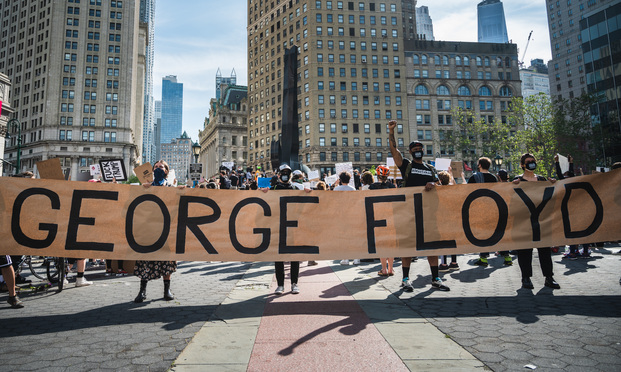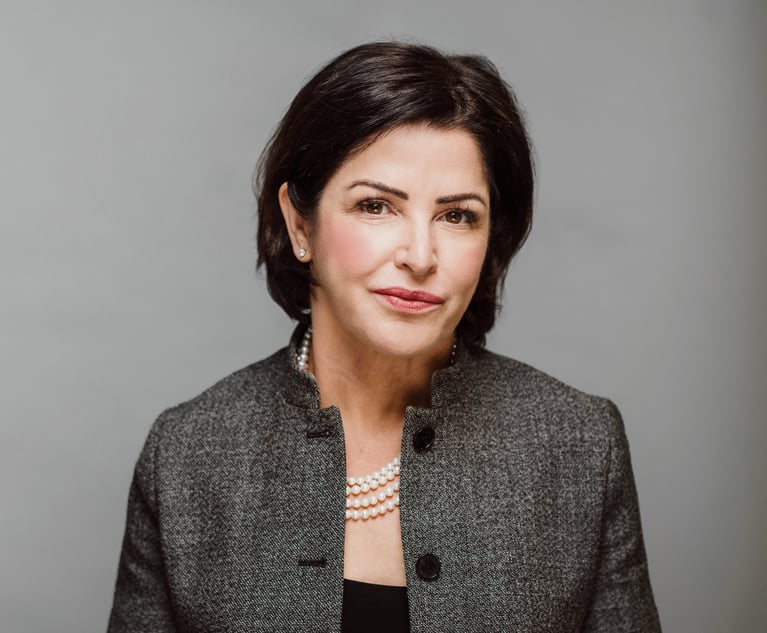What the Death of George Floyd Should Teach the Legal Industry
As a black CEO and former Big Law M&A lawyer, Bryan Parker offers practical tips on what law firms and the legal industry need to do to facilitate meaningful change.
June 02, 2020 at 02:56 PM
8 minute read
The original version of this story was published on The American Lawyer
 Demonstraters marched from lower Manhattan across the Brooklyn Bridge in New York City to protest the death of George Floyd. Photo: Ryland West/ALM
Demonstraters marched from lower Manhattan across the Brooklyn Bridge in New York City to protest the death of George Floyd. Photo: Ryland West/ALM
The ugliness of race and racism in America have again surfaced in a profound way. This ugliness touches our entire world. We, Legal Innovators, denounce racism in all its myriad forms. My co-founder, Jonathan Greenblatt, who spent 40 years in Big Law, joins me at this moment. We want to address our colleagues, and fellow leaders in the legal industry to ask what can be done about the events of the last week that have held the world at rapt attention. I will take the lead, as our CEO, and speak to you from the perspective of a black CEO and former Big Law M&A lawyer.
For starters, your black colleagues and associates are not alright. Please know the mental strain of dealing with recent events on top of figuring out how to make it through the COVID-19 pandemic has pushed your friends into a "present traumatic syndrome" of sorts. Last week, George Floyd, a black man, was extrajudicially executed by a member of the Minneapolis Police Department. His murder was captured on a video recording that has since been seen by millions around the globe. The officer, who has now been charged with third-degree murder, kneeled on George Floyd's neck for nearly nine minutes. We now know that Mr. Floyd was dead for the last two of those minutes. In his last moments, as the officer drained the life from him, George Floyd called for his mother and repeatedly uttered the refrain that has become all too familiar for many Black Americans "I CAN'T BREATHE." This trauma is a part of a continuing pattern for blacks in all walks of life. It is a trauma that has left a great many of us sad, angry and disillusioned.
This sense of outrage, shared by many, could be seen over the weekend where protests could be heard and witnessed around the globe. Protesters rallied against the killing of Mr. Floyd in the United States, as well as in the United Kingdom, Germany, Canada, Iran and New Zealand. I have had many colleagues reach out to me expressing their dismay. Many leading law firms and corporations have also denounced this killing. Expressing empathy is a start. Truly understanding why the empathy is needed, is a further step forward on the continuum toward finding a solution.
Ta-Nehisi Coates, in his book "Between the World and Me," states "Here is what I would like for you to know: In America, it is traditional to destroy the black body—it is heritage."
Whether it is Trayvon Martin, Mike Brown, Amy Cooper in Central Park recently weaponizing the police against a Harvard educated black man, Christian Cooper, who was in the park bird watching and only wanted Ms. Cooper to leash her dog to protect the bird sanctuary, or Breonna Taylor who was shot in her home by police, the message for many blacks has become clear—that large parts of America lack a basic respect for the sanctity or the humanness of black life. For some, this has become a mental bridge that is too far. Further to this point, this weekend we saw a black Pryor Cashman associate, Colinford Mattis, engage in behavior that we can never excuse—throwing explosive devices at police cars in New York. He has been charged federally. That said, to dismiss his actions, or to conflate them with the looting occurring in many places, runs the risk of confusing the wrongfulness of his actions or the looting occurring with the legitimacy of the outrage that provoked said actions. MLK taught us that "protests are language of the unheard." Whether it is an Ivy league-educated lawyer, or a person in the community scraping and hustling to get by, there is a loud message that blacks are sounding: "We matter and we want the state to stop killing us."
What can the legal community do to be a part of the needed solution? The following are some tangible steps that may be taken to address the issue at hand:
Internal
Listen to your colleagues.
- Understand their emotional state and determine if they need help. Show compassion, empathy and provide support.
- Allow black employees and other employees of color to provide input into solutions. The answers we seek will come from both bottom up, and top down, leadership.
- Use data, and root cause analysis, not just opinion, to drive solutions.
- Conduct sessions on implicit bias and create spaces that value employees of all hues and beliefs.
Ensure that diversity and inclusion initiatives remain a priority notwithstanding COVID-19.
- Don't allow D&I initiatives to be swept aside in the name of cost savings.
- Clients want diverse teams; well-balanced teams drive profit, not the opposite.
- Focus on hiring, retaining and promoting a diverse workforce.
External
Lead from the front.
- Set the moral standard. Ben Franklin said "Justice will not be served until those who are unaffected are as outraged as those who are." There is an incredible amount of privilege within the legal community. This privilege can be used to drive true change.
- Follow the example of the Minneapolis Police Chief, and call out injustices, quickly and without equivocation, against humanity. Truly show that blackness is valued and matters in this country, in your lives and in your workplaces.
- Put aside political labels and come together as a legal industry and demand change and fairness in the laws and justice system (e.g., police accountability commissions and independent prosecutors in the case of police involved killings).
- Have hard conversations. Truly addressing the issue of race is a hard, daunting task. Show the courage, black, white and otherwise, to speak truth, give safe space for all who would dialogue, and directly address our country's troubled history as it regards race, and once a common understanding is established, seek tangible solutions.
Lend your voice and expertise.
- Participate in forums like the Legal Innovators forum on Diversity & Inclusion on June 30.
- Support programs like the Belonging Project, the Diversity Lab and National Association of Minority and Women Owned Law Firms to name a few.
- Make the topic of race, police brutality, and equality central topics at bar association meetings, resource them properly and ensure the right senior level people are on hand to participate.
We realize that the above is only a start. We further realize that taking these steps will involve hard conversations. Jon, my business partner, is white, and I am black. We have given each other the permission to speak our truths for more than 20 years on these matters. I think we have been able to maintain a respectful dialogue and create a business, that in part, seeks to drive diversity in the profession. We therefore believe firmly that true change is only possible through frank and direct dialogue. If we do not engage, we cannot make the kind of progress we all desire and deserve to make. In a country where we often claim exceptionalism, it is our hope that we appeal to the nature of our better angels and that we truly be exceptional. The legal community can play a significant role. We hope that these inconvenient truths can be a start to this conversation.
Bryan Parker started his career with Shearman & Sterling on the M&A team, where Legal Innovators co-founder Jonathan Greenblatt was his mentor. This relationship inspired Jon and Bryan to found Legal Innovators where Parker runs the day-to-day operations of the company, which focuses on on-demand legal staffing, training, diversity and pricing. Jonathan L. Greenblatt and J. Applette Seibert of Legal Innovators contributed to this article.
This content has been archived. It is available through our partners, LexisNexis® and Bloomberg Law.
To view this content, please continue to their sites.
Not a Lexis Subscriber?
Subscribe Now
Not a Bloomberg Law Subscriber?
Subscribe Now
NOT FOR REPRINT
© 2025 ALM Global, LLC, All Rights Reserved. Request academic re-use from www.copyright.com. All other uses, submit a request to [email protected]. For more information visit Asset & Logo Licensing.
You Might Like
View All

Pallas Partners Founder On the Disputes Trends to Look Out For in 2025
4 minute read
What to Expect From Teresa Ribera, the EU‘s New Competition Commissioner
6 minute readLaw Firms Mentioned
Trending Stories
Who Got The Work
J. Brugh Lower of Gibbons has entered an appearance for industrial equipment supplier Devco Corporation in a pending trademark infringement lawsuit. The suit, accusing the defendant of selling knock-off Graco products, was filed Dec. 18 in New Jersey District Court by Rivkin Radler on behalf of Graco Inc. and Graco Minnesota. The case, assigned to U.S. District Judge Zahid N. Quraishi, is 3:24-cv-11294, Graco Inc. et al v. Devco Corporation.
Who Got The Work
Rebecca Maller-Stein and Kent A. Yalowitz of Arnold & Porter Kaye Scholer have entered their appearances for Hanaco Venture Capital and its executives, Lior Prosor and David Frankel, in a pending securities lawsuit. The action, filed on Dec. 24 in New York Southern District Court by Zell, Aron & Co. on behalf of Goldeneye Advisors, accuses the defendants of negligently and fraudulently managing the plaintiff's $1 million investment. The case, assigned to U.S. District Judge Vernon S. Broderick, is 1:24-cv-09918, Goldeneye Advisors, LLC v. Hanaco Venture Capital, Ltd. et al.
Who Got The Work
Attorneys from A&O Shearman has stepped in as defense counsel for Toronto-Dominion Bank and other defendants in a pending securities class action. The suit, filed Dec. 11 in New York Southern District Court by Bleichmar Fonti & Auld, accuses the defendants of concealing the bank's 'pervasive' deficiencies in regards to its compliance with the Bank Secrecy Act and the quality of its anti-money laundering controls. The case, assigned to U.S. District Judge Arun Subramanian, is 1:24-cv-09445, Gonzalez v. The Toronto-Dominion Bank et al.
Who Got The Work
Crown Castle International, a Pennsylvania company providing shared communications infrastructure, has turned to Luke D. Wolf of Gordon Rees Scully Mansukhani to fend off a pending breach-of-contract lawsuit. The court action, filed Nov. 25 in Michigan Eastern District Court by Hooper Hathaway PC on behalf of The Town Residences LLC, accuses Crown Castle of failing to transfer approximately $30,000 in utility payments from T-Mobile in breach of a roof-top lease and assignment agreement. The case, assigned to U.S. District Judge Susan K. Declercq, is 2:24-cv-13131, The Town Residences LLC v. T-Mobile US, Inc. et al.
Who Got The Work
Wilfred P. Coronato and Daniel M. Schwartz of McCarter & English have stepped in as defense counsel to Electrolux Home Products Inc. in a pending product liability lawsuit. The court action, filed Nov. 26 in New York Eastern District Court by Poulos Lopiccolo PC and Nagel Rice LLP on behalf of David Stern, alleges that the defendant's refrigerators’ drawers and shelving repeatedly break and fall apart within months after purchase. The case, assigned to U.S. District Judge Joan M. Azrack, is 2:24-cv-08204, Stern v. Electrolux Home Products, Inc.
Featured Firms
Law Offices of Gary Martin Hays & Associates, P.C.
(470) 294-1674
Law Offices of Mark E. Salomone
(857) 444-6468
Smith & Hassler
(713) 739-1250









